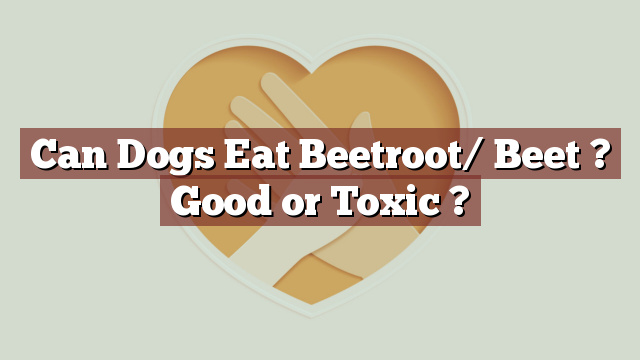Can Dogs Eat Beetroot/Beet? Good or Toxic?
As pet owners, it is crucial to be aware of what foods are safe for our furry friends. While some human foods can be shared with dogs, others can be toxic and pose serious health risks. One such food that often sparks curiosity is beetroot, a nutrient-rich vegetable. In this article, we will explore whether dogs can safely consume beetroot and the potential risks and benefits associated with it.
Nutritional Value of Beetroot for Dogs
Beetroot is a vibrant vegetable packed with essential nutrients. It is a great source of vitamins such as vitamin C, vitamin A, and vitamin K. Additionally, beetroot contains minerals like potassium, magnesium, and iron. This vegetable is also rich in fiber, which can aid in digestion and promote a healthy gut.
Can Dogs Eat Beetroot? Safety and Toxicity
Can dogs eat beetroot? The answer is yes, dogs can safely eat beetroot. This vegetable is not toxic to them and can be a nutritious addition to their diet. However, as with any new food, it is important to introduce beetroot gradually into your dog’s diet to avoid any digestive upset.
While beetroot itself is not harmful to dogs, certain preparations or additions can be problematic. It is crucial to avoid feeding your dog pickled or seasoned beetroot, as the excess salt, spices, and additives can be harmful. Stick to giving your dog plain, cooked, and unseasoned beetroot to ensure their safety.
Potential Risks and Benefits of Feeding Beetroot to Dogs
Feeding beetroot to dogs can have various benefits. The high fiber content in beetroot can aid in maintaining a healthy digestive system and prevent constipation. The vitamins and minerals present in beetroot can contribute to a strong immune system and overall well-being. Additionally, some studies suggest that beetroot may have antioxidant and anti-inflammatory properties, which can be beneficial for dogs.
However, it is important to note that excessive consumption of beetroot can lead to an increase in sugar levels, as beetroot contains natural sugars. This can be a concern for dogs with diabetes or those prone to obesity. Therefore, moderation is key when incorporating beetroot into your dog’s diet. Always consult with your veterinarian to determine the appropriate portion size based on your dog’s individual needs.
What to Do if Your Dog Eats Beetroot
If your dog accidentally consumes a large amount of beetroot, it is generally not a cause for concern. However, if your dog experiences any adverse symptoms such as vomiting, diarrhea, or abdominal discomfort, it is recommended to consult your veterinarian for further guidance. They will be able to assess the situation and provide appropriate advice or treatment if necessary.
Conclusion: Beetroot can be a nutritious addition to your dog’s diet, but moderation is key.
In conclusion, beetroot can be a safe and nutritious addition to your dog’s diet. It is packed with essential vitamins, minerals, and fiber that can contribute to their overall health. However, it is important to feed beetroot in moderation and avoid seasoned or pickled varieties. Always consult with your veterinarian before introducing any new food into your dog’s diet to ensure their specific nutritional needs are met. By following these guidelines, you can safely incorporate beetroot into your furry friend’s meals and provide them with a wholesome and balanced diet.
Thank you for investing your time in exploring [page_title] on Can-Eat.org. Our goal is to provide readers like you with thorough and reliable information about various dietary topics. Each article, including [page_title], stems from diligent research and a passion for understanding the nuances of our food choices. We believe that knowledge is a vital step towards making informed and healthy decisions. However, while "[page_title]" sheds light on its specific topic, it's crucial to remember that everyone's body reacts differently to foods and dietary changes. What might be beneficial for one person could have different effects on another. Before you consider integrating suggestions or insights from "[page_title]" into your diet, it's always wise to consult with a nutritionist or healthcare professional. Their specialized knowledge ensures that you're making choices best suited to your individual health needs. As you navigate [page_title], be mindful of potential allergies, intolerances, or unique dietary requirements you may have. No singular article can capture the vast diversity of human health, and individualized guidance is invaluable. The content provided in [page_title] serves as a general guide. It is not, by any means, a substitute for personalized medical or nutritional advice. Your health should always be the top priority, and professional guidance is the best path forward. In your journey towards a balanced and nutritious lifestyle, we hope that [page_title] serves as a helpful stepping stone. Remember, informed decisions lead to healthier outcomes. Thank you for trusting Can-Eat.org. Continue exploring, learning, and prioritizing your health. Cheers to a well-informed and healthier future!

